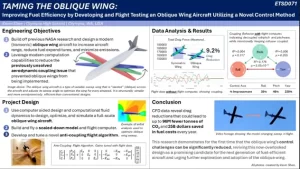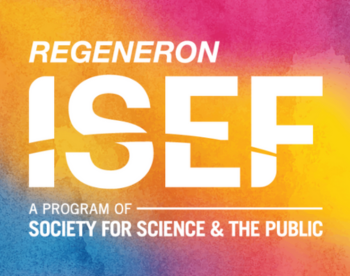Regeneron ISEF 2024 ETSD First Award: Highlights and Analysis
In the previous article, Embark Tutor analyzed the winning projects in the Energy: Sustainable Materials and Design (EGSD) category in detail. Today, let's turn our attention to the Engineering Technology: Statics and Dynamics (ETSD) category of the 2024 ISEF Global Finals to see how these outstanding research projects stand out from the fierce competition.
In the 2024 ISEF Global Finals, the Engineering Technology: Statics and Dynamics category mainly studies the mechanical behavior of objects at rest and in motion and the design of mechanical systems. These studies help optimize the stability and efficiency of structural design and engineering projects and promote the development and innovation of engineering technology. By in-depth research on statics and dynamics, mechanical problems in actual engineering are solved, and the sustainability and safety of engineering projects are improved.
When we talk about statics and dynamics in engineering technology, we are actually exploring the mechanical behavior of objects at rest and in motion. These studies are crucial to the stability and efficiency of engineering design, and they help optimize structural design and improve the sustainability and safety of engineering projects.
Embark's ISEF online private tutoring service is dedicated to supporting students interested in the field of Engineering Technology statistics and Dynamics (ETSD). Our team of teachers has extensive experience in engineering project design and mechanical analysis. Through personalized guidance and practical projects, they will help students deeply understand the principles and applications of statics and dynamics, master related techniques and methods, and achieve excellent performance in ISEF competitions.
In this article, Embark teachers carefully analyze the ETSD first prize project, aiming to provide readers with more thinking perspectives and learning resources, hoping to inspire inspiration and promote academic exchanges.
Regeneron ISEF 2024 ETSD First Award-Highlights
- Project Name
ETSD071 - Improving Oblique Wing Aircraft Control
- Project Introduction
This Regeneron ISEF Award-Winning Project designs and tests an innovative oblique wing aircraft, which uses modern flight computer technology to optimize the wing design and significantly reduce aerodynamic coupling problems. Through computer-aided design, swept theory optimization, and computational fluid dynamics simulation analysis, it is verified that the design can reduce drag by 9.2%, thereby saving global fuel costs and reducing carbon dioxide emissions.
In the experimental stage, aerodynamic coupling was successfully overcome through customized flight computers and novel anti-coupling flight codes, greatly improving flight safety and pilot control authority. This study demonstrates the great potential of oblique wing design and is expected to become a strong candidate for the next generation of fuel-efficient aircraft.
Regeneron ISEF 2024 ETSD First Award-Analysis
The project focuses on the research of oblique wing aircraft, an innovative design that can adapt to different flight speeds and effectively reduce drag by rotating the wings. Based on NASA's early research, the project team used computational fluid dynamics (CFD) software to conduct in-depth fluid analysis, compared the drag of the swept wing, and optimized the wing design.
It is worth mentioning that the project not only stayed in the theoretical analysis stage but also made an aircraft entity and collected a large amount of attitude data through physical flight tests. The comparative analysis of these data provides empirical support for the effectiveness and performance of the design. In addition, the project performed well in video production and fully demonstrated the research results, which is relatively rare in scientific research projects.
Most importantly, the project closely follows the theme of energy conservation and environmental protection, reduces fuel consumption by reducing flight resistance, and then reduces carbon emissions, which has significant environmental value. Overall, the project has outstanding advantages in technological innovation, practical verification, and environmental protection concepts.
We have delved into the essence of the Regeneron ISEF 2024 ETSD First Award project, which gave us a deeper understanding of the latest developments in engineering statistics and dynamics. Next, we will turn to explore the Regeneron ISEF 2024 ENEV First Award project to find the spark of innovation in the field of environmental engineering.
In addition, let me introduce you to Embark Education. We focus on providing students with personalized scientific research project services, aiming to help them achieve excellent results in ISEF competitions. If you are interested in participating in the ISEF project and are eager to receive ISEF professional scientific research training and guidance, we welcome you to learn more about Embark. Let us pursue the mysteries of science together and open up the road to future technology.
Click here to view the analysis of previous Regeneron ISEF 2024 winning works:
1. The Regeneron ISEF 2024 Global Finals Winning Projects: Highlights and Analysis
2. Regeneron ISEF 2024 BMED First Award: Highlights and Analysis
3. Regeneron ISEF 2024 ENBM First Award: Highlights and Analysis
4. Regeneron ISEF 2024 CELL First Award: Highlights and Analysis
5.Regeneron ISEF 2024 CBIO First Award: Highlights and Analysis
6.Regeneron ISEF 2024 EBED First Award: Highlights and Analysis
7. Regeneron ISEF 2024 EGSD First Award: Highlights and Analysis



